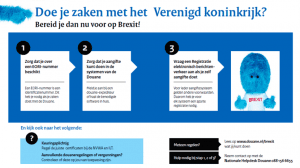From January 1, doing business with the UK will become more complicated and the Dutch IT sector, which is used to quick and easy import and export, will also notice. The changes have a lot to do with Brexit, but there are other reasons as well. Anyone who receives and sends shipments should know what this means for their business.
Export value more than 1 billion euros
The Dutch business community does a lot of business with the UK. The IT sector knows all about this. Hardware is exported but also imported on a large scale. Accordingly CBS In 2019, $140 million worth of computers were shipped from the Netherlands via the North Sea. This concerns computers assembled here. The value of computers produced elsewhere and exported to the UK was over €1 billion. A slightly lower amount was recorded for the category “office machines”. This also includes IT equipment.
New VAT Rules
Until now, exports to the UK have been carried out according to EU rules. The number of administrative procedures to send a laptop, or a whole pallet, is rather limited and, above all, a process that has been familiar to every shipper, carrier and recipient.
That will change from January 1. The British will then be effectively outside the EU, so the free movement of goods will end. At the same time, new VAT rules come into force. This is partly linked to Brexit, but it could also be directly linked to a change in EU policy.
Anyone exporting to the UK – no matter the size – must be registered with UK Customs. Exporters must charge Value Added Tax (VAT) on the customer’s order. Customs registration is required for this process. The annual cost of this is set at £1,000. For large volume exporters, this is likely to be a cost that can be easily recouped. It is an unpleasant hurdle for parties exporting smaller quantities.
Exporters exit
Anyone who has followed the reports on UK VAT rules in recent months will have seen exporters across the board pull out. From January 1, deliveries to UK addresses will no longer be possible. It’s not just EU retailers taking this step, it’s also US retailers, for example. Since the UK is no longer part of the EU, the £15 exemption threshold will no longer apply either. This makes shipping some small items much more expensive.
What about imports?
The combination of VAT rules and Brexit also has consequences for importing goods from the UK. The paperwork for the sender, carrier and recipient will increase, and with it the costs. There is currently no prospect of an agreement between the UK and the EU. It is therefore possible that additional costs will apply to the import of equipment (just like for exports).
Uncertainty abounds.

Let’s be clear: the UK’s new rules on imports… Exports Applies to all sectors and product types. This also includes the wide trade flows of refurbished devices!
(A Refurbished devices suggested: ITchannelPRO is working on a special topic on this topic and is still contacting parties)
